 Petzlover
Petzlover Greater Swiss Mountain Dog is originated from Switzerland but Kerry Blue Terrier is originated from Ireland. Greater Swiss Mountain Dog may grow 21 cm / 9 inches higher than Kerry Blue Terrier. Greater Swiss Mountain Dog may weigh 52 kg / 115 pounds more than Kerry Blue Terrier. Greater Swiss Mountain Dog may live 3 years less than Kerry Blue Terrier. Both Greater Swiss Mountain Dog and Kerry Blue Terrier has almost same litter size. Both Greater Swiss Mountain Dog and Kerry Blue Terrier requires Moderate Maintenance.
Greater Swiss Mountain Dog is originated from Switzerland but Kerry Blue Terrier is originated from Ireland. Greater Swiss Mountain Dog may grow 21 cm / 9 inches higher than Kerry Blue Terrier. Greater Swiss Mountain Dog may weigh 52 kg / 115 pounds more than Kerry Blue Terrier. Greater Swiss Mountain Dog may live 3 years less than Kerry Blue Terrier. Both Greater Swiss Mountain Dog and Kerry Blue Terrier has almost same litter size. Both Greater Swiss Mountain Dog and Kerry Blue Terrier requires Moderate Maintenance.
 Hailing from Switzerland, and one of its oldest dog breeds, the Greater Swiss Mountain Dog has a dubious history in that there are a number of theories as to its origin. He is closely related to the Bernese Mountain Dog, Saint Bernard and Rottweiler.
Hailing from Switzerland, and one of its oldest dog breeds, the Greater Swiss Mountain Dog has a dubious history in that there are a number of theories as to its origin. He is closely related to the Bernese Mountain Dog, Saint Bernard and Rottweiler.
Of all the theories, the one that says he is descended from large, mastiff-like dogs is a popular one. He used to be a herding- and guard dog, but also was used to pull carts of farm produce.
It was in the 1900s that the dog’s numbers started dwindling. In 1908, canine researcher, Albert Heim recognized the dogs as being large members of the Sennenhund type, a family of four breeds that includes the Greater Swiss Mountain Dog.
He wanted to see the dogs recognized as a separate breed and the Swiss Kennel Club listed the Greater Swiss Mountain Dog in 1909.
In 1968 they were brought to the United States and a club for them was formed. The dog was recognized by the American Kennel Club in 1995 with the dog being recognized as a member of the Working group.
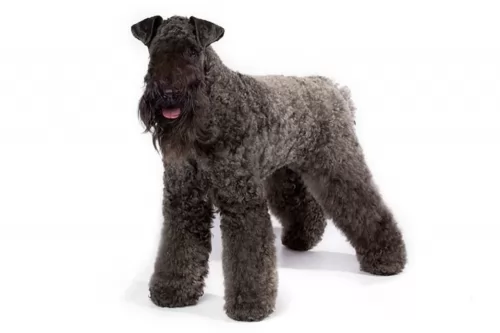 The Kerry Blue Terrier hails from Ireland, with the name of the dog coming from a place known as County Kerry, and Blue being the color of the dog's coat.
The Kerry Blue Terrier hails from Ireland, with the name of the dog coming from a place known as County Kerry, and Blue being the color of the dog's coat.
The Kerry Blue was originally bred to control rats, rabbits and otters and was actually a working dog for a host of different jobs.
It was in 1922 that the United States Kerry Blue Terrier Club was founded and recognized by the AKC in 1924.
 Swissies, as they are often referred to as, are large, robust dogs, standing at 65–72cm and weighing anything between 50 – 70kg, with the females being slightly smaller and weighing a little less.
Swissies, as they are often referred to as, are large, robust dogs, standing at 65–72cm and weighing anything between 50 – 70kg, with the females being slightly smaller and weighing a little less.
He has big, rounded paws, medium length floppy ears, a broad chest and a long tail. This is a heavy-boned dog, strong while still being agile.
His dense, double coat is black, white and tan or rust, with black on top of the dog's back, ears, tail and legs. There are two rust dots above each eye. The coat can be short and straight to medium length, coarse and wavy. The dog sheds throughout the year with a major shedding a couple of times a year.
The Greater Swiss Mountain Dog is a sociable canine, thriving on being part of a loving human family. While he used to be a working farm dog, today he is essentially a family pet, though he loves to still be busy.
He is generally friendly with strangers, but just like with all other dog breeds, he will need to be trained and socialized to turn him into an even-tempered, obedient dog, capable of getting on well with children and pets in the the home.
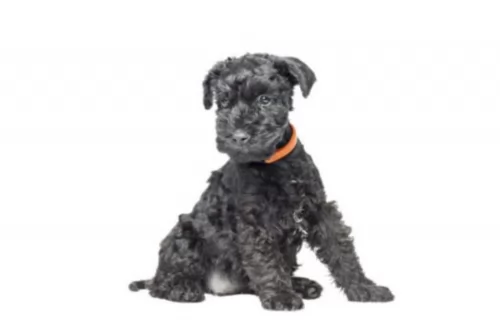 The Kerry Blue is a small dog standing at between 44 to 51cm and weighing anything between 15 and 18kg. He has dark eyes which give him that typical alert Terrier expression.
The Kerry Blue is a small dog standing at between 44 to 51cm and weighing anything between 15 and 18kg. He has dark eyes which give him that typical alert Terrier expression.
The ears are small and are carried up before flopping down. The high-set tail has always been customarily docked, giving him a compact, jaunty appearance but these days, the tail tends to be left long, curling somewhat over the back.
He has a coat which is quite wavy or curly and comes in different shades of grey or blue, while the puppies are born black, gradually becoming more blue. The dog is considered to be hypoallergenic as it doesn't shed a lot.
Kerry Blue Terriers are strong willed dogs, but with training and socialization they respond well to instructions such as sit, come, lie-down and stay. As a Terrier breed he is feisty, lively, strong-willed, stubborn, independent and impulsive. They are loyal and affectionate towards their owners and are amicable with children and pets in the home.
Training and socialization develops a balanced attitude around his human family, other animals in the home and around strangers. He is an active dog too so whether he lives in the city or the countryside, he will require a lot of exercise as he is full of life.
You can’t just put him in the backyard and forget about him. He is an intelligent, social dog who will only do well when he is counted in as a family member.
 The Swissy is an easy going dog and adapts easily into his human family’s lifestyle. He is big, but agile dog known for his gentle temperament.
The Swissy is an easy going dog and adapts easily into his human family’s lifestyle. He is big, but agile dog known for his gentle temperament.
While he loves the outdoors, he is a social dog and loves nothing more than coming indoors and being close to his human family.
He loves his family and won’t do well if left outside for days without human companionship. Treat him well and you’ll be rewarded with a loyal, loving 4-legged family member.
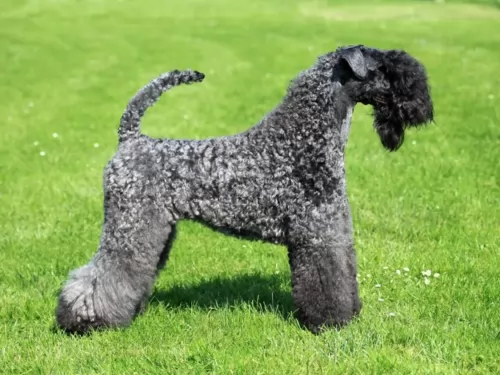 When you bring a Kerry Blue Terrier into your home and your life, you’re going to have a jaunty, lively, comical pet in your home, as he certainly has the reputation of making people laugh.
When you bring a Kerry Blue Terrier into your home and your life, you’re going to have a jaunty, lively, comical pet in your home, as he certainly has the reputation of making people laugh.
He is such an intelligent dog too and has no difficulty with learning new tricks. He takes his role of watchdog seriously too, as he loves his human family and wants to be looking out for them.
When you bring a Kerry Blue Terrier into your home, you can be assured of jolly good fun from a true canine companion.
 The GSMD or Sennenhund, as his name is shortened to, is a fairly healthy dog breed, with very few health issues.
The GSMD or Sennenhund, as his name is shortened to, is a fairly healthy dog breed, with very few health issues.
He has an average lifespan of 10 to 12 years, and although not likely, he can suffer from minor problems such as gastric torsion as well as female urinary incontinence. If your female dog is dribbling urine in her sleep, there are a number of reasons that can be causing it - bladder infections, a medical condition or a weakened bladder with spayed female dogs.
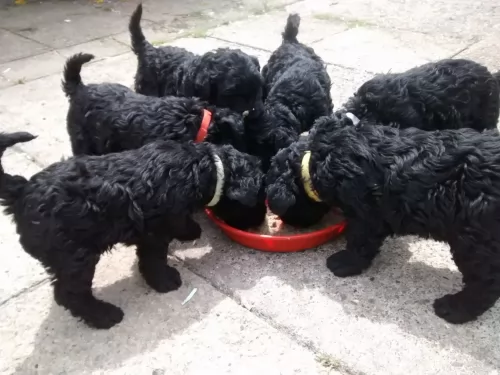 You aren’t going to be running to the vet often with your Kerry Blue as he is a healthy dog breed. However there are some common dog diseases that even the most healthiest of dogs can succumb to.
You aren’t going to be running to the vet often with your Kerry Blue as he is a healthy dog breed. However there are some common dog diseases that even the most healthiest of dogs can succumb to.
Always feed your dog the very best food there is so that he has a strong immune system that can fight off disease.
This is the inward rolling of the eyelid which can irritate the dog’s eye and even cause vision loss. Surgery can treat the problem.
Every dog can succumb to cancer. You may well find a lump or even detect a sore that won’t heal. Treatments for cancer can include medicines, chemotherapy and surgery.
This is an inherited condition to do with the hip joint. It can result in pain for your dog and even lameness. When you discover your pet no longer wants to play and he battles to get up after lying down, he will need to go to the vet. Dogs with this debilitating disease should never be bred.
 The Greater Swiss Mountain Dog is a robust dog and thrives on a diet of kibble to raw meat to some cooked home-made food such as chicken, brown rice and vegetables.
The Greater Swiss Mountain Dog is a robust dog and thrives on a diet of kibble to raw meat to some cooked home-made food such as chicken, brown rice and vegetables.
A serious issue with the GSMD is overfeeding, resulting in uncomfortable digestive problems and of course, obesity.
Your GSMD isn’t a dog that is going to require a lot of exercise like some of the other dog breeds there are, but still his working career of the past requires that he still be taken on daily walks, enjoys ball- and rope games and to go swimming.
Brush your dogs coat at least twice a week to remove loose hears. Other grooming aspects include cleaning the ears to avoid infection, clipping his nails and brushing his teeth at least twice a week.
If you’re not sure how to do all these things, there are useful accessories for dogs that allow you to do all this grooming on your own. Your vet can also show you how as these are all things that will require ongoing attention.
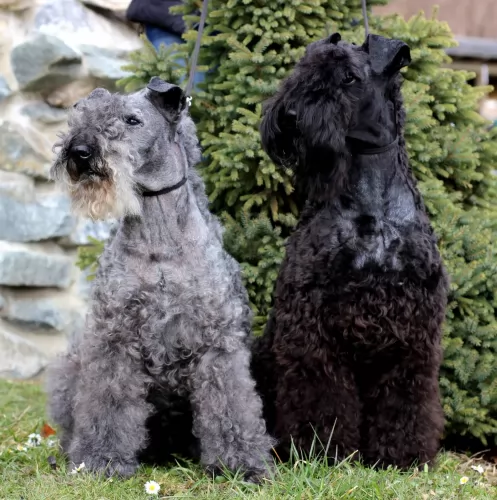 The Kerry Blue’s coat doesn’t shed a lot but it’s a curly coat that will require brushing at least twice a week. He will also require clipping and trimming if you want to keep the coat manageable.
The Kerry Blue’s coat doesn’t shed a lot but it’s a curly coat that will require brushing at least twice a week. He will also require clipping and trimming if you want to keep the coat manageable.
Nutrition is a key part of a healthy Kerry Blue Terrier and instead of just plonking down a bowl of dry kibble every day, make his mealtimes something to look forward to, more sustaining and more interesting.
Top quality kibble is good every now and then but try mixing in some cooked chicken, brown rice, pasta and vegetables occasionally as well as a little bit of raw meat. You will be rewarded with bright eyes, a wet nose, bushy, wagging tail and less trips to the vet.
Make sure there is always a supply of fresh, cool water for him.
Active and lively, your Kerry Blue will need lots of robust exercise – a daily walk as well as ball games which ensure his muscles are kept strong and toned. Not only that, this exercise is important for keeping him fit and also mentally alert.